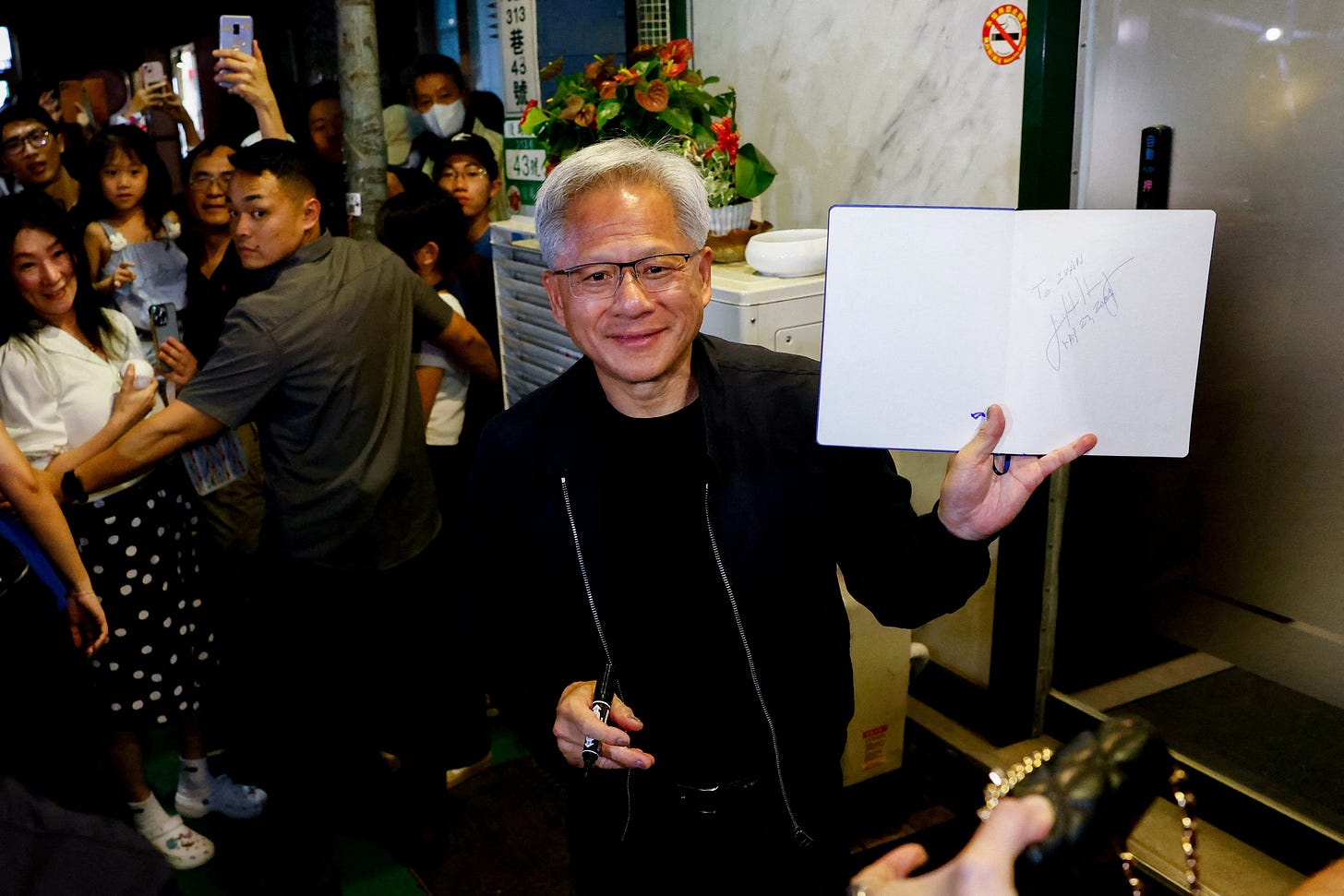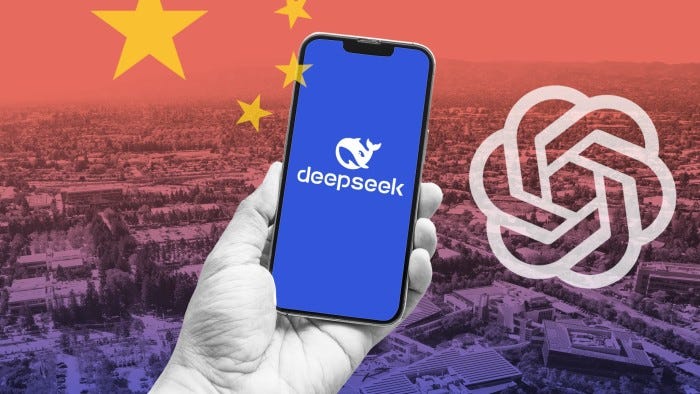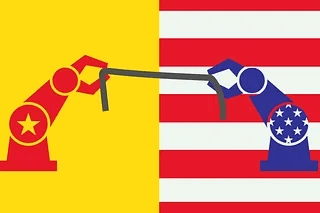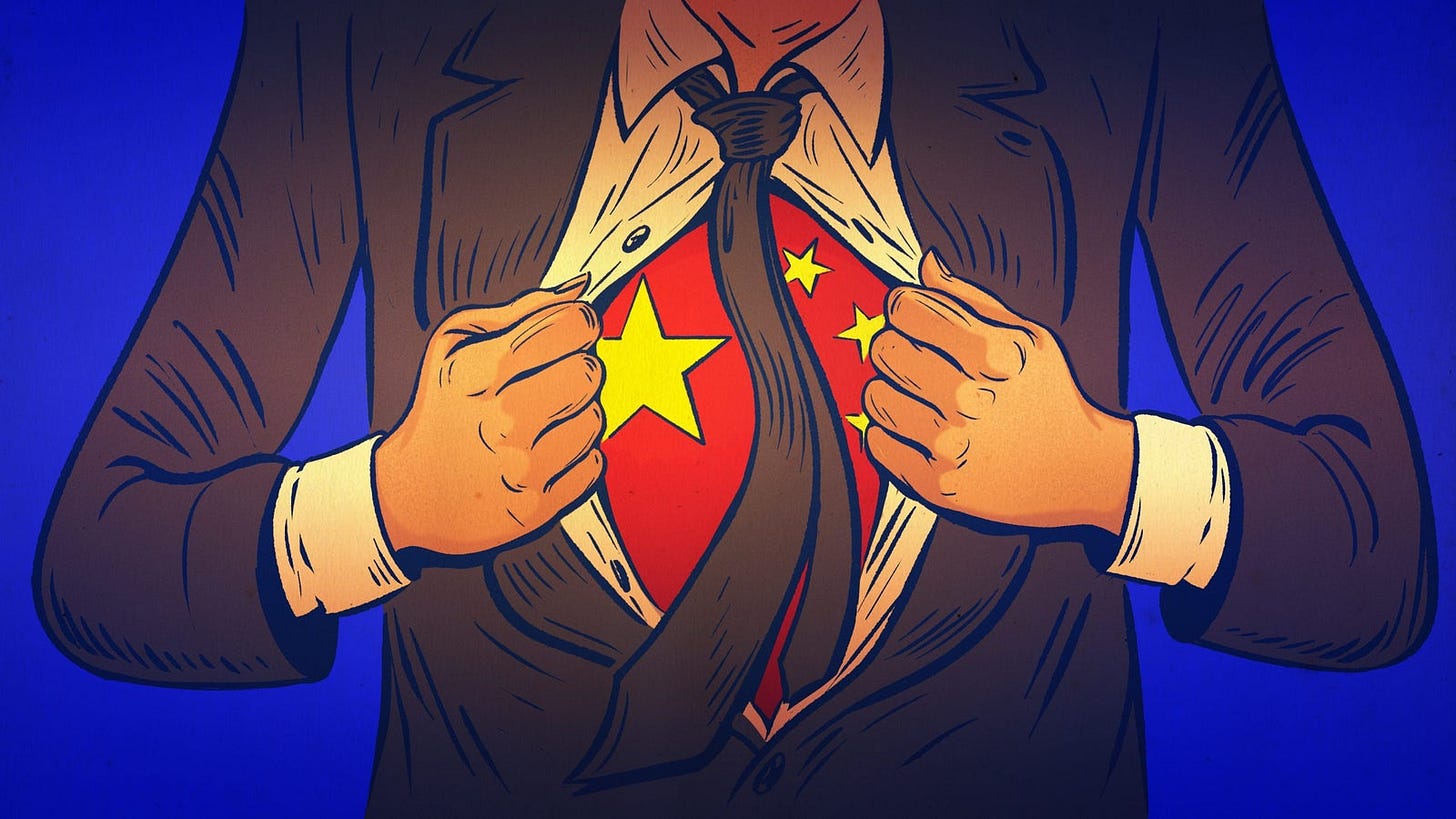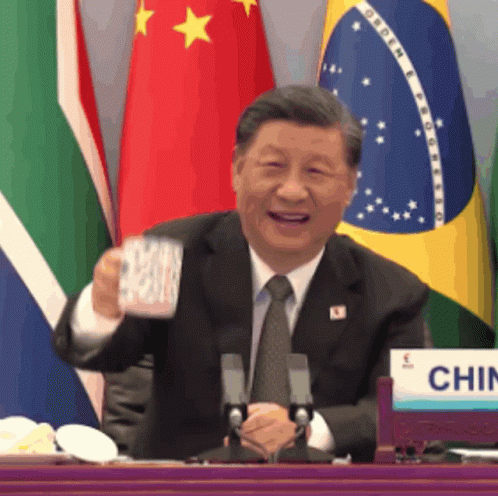
AI: AI 'Made in China' Feature, not a Bug. RTZ #724
There is a little bit of misplaced sense in the US, especially in DC, that China is but a ‘copycat’ of US innovation, and as such has been unfairly leveraging US innovations, especially in technology, to make ‘cheaper’ stuff and sell it around the world. So the ‘obvious’ solution is to cut China off US technology, and watch them fade away in the background in this self-envisioned AI Tech Wave ‘space race’.
And watch the US beat China through this ‘AI Sputnik moment, like we beat past ‘Communist’ adversaries. Especially as DC ‘China Hawks’ tire of ‘threading the needle’ with China on geopolitically powered ‘RealTekPolitik’. With every weapon including tariffs.
That nonsense couldn’t be further from the truth. China as I’ve articulated in these pages, has emulated and surpassed US spirit of global capitalism, powered by bottoms up entrepreneurship and innovation. And especially in the field of technology, is well on its way to beating the US at its own ‘infinite game’ of global technology platforms, innovation, and commercial success.
Nowhere is that more clear in this AI Tech Wave, than in how Chinese AI company DeepSeek, has caught the world by storm in open source AI innovation, both in core LLM AIs, and AI Reasoning technologies. And companies like Butterfly Effect’s Manus are following fast in AI Agents. As are a host of Chinese companies in the arena of ‘Physical AI’ in robots, EVs, drones and beyond with companies like Unitree, BYD, DJI and dozens more.
And this is now coming through with Chinese AI companies now leaning into their ‘Made in China’ status globally, than shirking away from that label.
Rest of World explains this trend well in “Chinese startups once downplayed their origin. Now some celebrate it”:
“Increased scrutiny of Chinese tech companies pushed startups to hide their roots overseas.”
“DeepSeek’s success has emboldened some Chinese founders to tout advantages of China talent and operations.”
“Startups chasing foreign investment are more likely to pursue China-shedding.”
The US and western curbs have not yet dented Chinese companies in their enthusiasm and ability to compete globally.
“For years, as governments in the U.S., Europe, and elsewhere restricted Chinese apps and technologies over national security concerns, many companies practiced what came to be known as China shedding — downplaying and obscuring their origin in overseas markets to win over investors and customers. But the global success of Chinese social media apps and the launch of a successful AI model by startup DeepSeek earlier this year have convinced some founders like Wu that they no longer need to do so.”
“DeepSeek has shown us that as long as our product is competitive, we should not worry too much about being a Chinese company,” Wu told Rest of World. “The popularity that TikTok and RedNote have been receiving in the U.S. shows us that users are actually welcoming towards good Chinese products,” Wu said, adding that her film-generation platform has steadily grown its user base across the U.S. and East Asia while being openly Chinese.”
And this shift is palpable:
“Wu’s confidence signals a shift among Chinese startups. Rather than avoiding calling attention to their Chinese roots, they are promoting the competitive advantages of being Chinese. DeepSeek’s rise has attracted foreign investors searching for the next Chinese tech breakout, and Chinese tech companies are launching English-language product videos and even speaking with foreign media — something that executives had shied away from.”
And as mentioned above, it’s coming through in fields beyond pure LLM AIs:
“Startup founders who spoke with Rest of World said they are leaning into the strengths of their Chinese roots — such as engineering talent and cheaper production costs — while hiring foreign staff and complying with local regulations to avoid the sort of scrutiny faced by larger firms, such as TikTok, drone company DJI, and top electric vehicle maker, BYD.”
“Jia Zijian, who launched his language-learning app TalkMe on global app stores last year, said DeepSeek’s success is proof of Chinese startups’ competitiveness.”
“DeepSeek gives Chinese tech startups an image boost. … I believe foreign companies can hardly compete with the kind of innovation we create with such cost efficiency,” Jia told Rest of World.”
Increasingly its coming through ‘Made in Singapore’ shingles, close enough to China:
“Although his 10-person team is based in Beijing, Jia registered his company in Singapore last year, like many Chinese companies have done to avoid close scrutiny, a move that has come to be known as Singapore-washing. His goal was to better attract foreign capital, he said.”
“Where we place our company tells people where we are focused,” he said. Conversations with investors led him to believe that “there is no need to cover up, but also no point branding as Chinese,” he said, adding that his app was built entirely on foreign AI models and that all transactions were made through foreign banks.”
And many are still continuing to come to America. Which is a good thing and should be encouraged:
“Jia’s strategy is a common one. Some Chinese apps that launched in the past three years, such as short-form video app ReelShort and AI video generator HeyGen, have moved their operations and staff to California even as they have been open about their Chinese origin.”
“This approach is a mix of pride and pragmatism, said Ivy Yang, a China tech analyst and founder of New York–based consulting firm Wavelet Strategy, which provides communications and reputation management services for Chinese companies in the U.S.”
“I wouldn’t go as far as to say that Chinese AI companies will suddenly make their Chineseness a selling point, but [it was] definitely a sigh of relief [after DeepSeek’s launch] that they will be less likely penalized for it,” Yang told Rest of World.”
And the blending of Chinese and US leadership of these companies should be encouraged beyond the convenience of national labels:
“Chinese companies have long hired Westerners to project an international image — sometimes as executives, other times as paid actors for events — a practice so widespread it is known as the rent-a-foreigner industry. That strategy has since evolved.”
As mentioned earlier, Chinese company Butterfly Effect of Manus fame, is rapidly evolving beyond the DeepSeek template:
“Chinese startup Butterfly Effect, creator of general-purpose AI agent Manus, is reportedly considering relocating its headquarters to Singapore and has already registered a corporate entity there, as it raised $75 million from U.S. venture capital firm Benchmark.”
That a blue-chip US VC like Benchmark is wading back into the waters of investing in ‘China tech’ companies, is an immensely encouraging counter-trend from my perspective. It should be an example to be followed. Particularly since the last few years have seen leading US VC companies shed operations in China for near-term political reasons.
Understand the geopolitical, ‘RealTekPolitik’ environment remains tough. And the US government seems focused on being ‘China Hawks’ on a bipartisan basis.
“Chinese tech companies remain wary of political tensions and regulatory scrutiny, particularly in the U.S. TikTok faces a potential ban in June unless its Chinese parent company ByteDance sells it, although U.S. President Donald Trump has said he would extend the deadline. The short-video app, registered in Singapore, has faced concerns regarding data security and privacy as well as Chinese government influence. TikTok, which has a Singaporean CEO, has denied these allegations.”
“The U.S. government is also assessing whether Chinese drone-maker DJI should face restrictions on national security grounds. BYD faces similar concerns in some countries.”
This pendulum has swung farther than it should away from China, especially given the gravitational physics of global technology, supply chains and markets.
For a good overview of the realities of China vs US, I’d encouraging watching this YouTube video with Tom Friedman of the New York TImes with Ezra Klein, and reading these recent Friedman pieces on the subject.
What comes through with even a cursory examination of the evidence, that the US’s core opportunity long-term is to compete freely with China. Not try to throw obstacles in the competitive markets globally.
And ultimately, it’s the capitalist spirit of entrepreneurs on the ground, be they in China, the US, or any other place in the world, that will make or break global success in this AI Tech Wave for companies large and small. One just has to wait for it. Stay tuned.
(NOTE: The discussions here are for information purposes only, and not meant as investment advice at any time. Thanks for joining us here)


